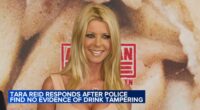Share this @internewscast.com
In May, Sir David Attenborough marked his 99th birthday, attributing his enhanced well-being to notable dietary adjustments. The renowned broadcaster, celebrated for his iconic BBC nature documentaries, has notably reduced his intake of red meat, although he acknowledges he hasn’t completely embraced vegetarianism.
In a 2017 interview with The Sun, Attenborough shared, “I have certainly changed my diet. Not in a dramatic way. But I don’t think I’ve eaten red meat for months.” He added, “I do eat cheese, I have to say, and I eat fish. But by and large, I’ve become much more vegetarian over the past few years than I thought I would ever be.”
This shift in Attenborough’s diet aligns with growing research that links excessive red meat consumption to significant health issues, which can degrade one’s quality of life and potentially heighten the risk of early death. Earlier this year, Harvard scientists published research highlighting a ‘significant link’ between ‘heme iron’ and the onset of type 2 diabetes.
Heme iron, present in beef, lamb, liver, and certain fish, is easily absorbed by the body, according to a report by Surrey Live. Professors Frank Hu and Fredrick J. Stare emphasized the study’s implications, stating, “This study underscores the importance of healthy dietary choices in diabetes prevention. Reducing heme iron intake, particularly from red meat, and adopting a more plant-based diet can be effective strategies in lowering diabetes risk.”
Reducing red meat consumption is associated with longevity and a decreased risk of premature death. Greater health advantages arise from substituting red meat with healthier proteins or plant-based alternatives. Research consistently indicates a correlation between high red meat consumption, especially processed types like bacon, hot dogs, and deli meats, and an increased risk of mortality from all causes, including heart disease and cancer.
Eating less red meat can help you live longer and reduce the risk of premature death. You get even more health benefits if you swap red meat for healthier proteins or plant-based foods. Research shows that eating a lot of red meat, especially processed types like bacon, hot dogs, and deli meats, is linked to a higher risk of dying from all causes, heart disease, and cancer.
The NHS also warns against excessive consumption of processed and red meat, warning it could elevate the risk of bowel cancer. The health service claimed: “Processed meat can also be high in salt and eating too much salt can increase your risk of high blood pressure.”
Their guidance added that, if people currently eat “more than 90g” of cooked red or processed meat a day, they should think about cutting that down to 70g to make some sort of difference if completely quitting isn’t an option.
Red meat includes beef, lamb, mutton, pork, veal, venison and goat. Meats from birds like chicken and turkey are considered white meat.
Despite health concerns, red meat has been identified as an excellent source of high-quality protein, with around 30g of protein per 100g of meat. It has also been labelled as having a rich amount of iron, an important nutrient for making red blood cells.
However, as with all foods, eating items in moderation as part of a balanced diet is considered the healthiest approach to life. If you have any concerns about adding or removing items from your normal diet, speak to a doctor.
Aside from his nutritious eating habits, Sir David reportedly admitted to Anderson Cooper during a 2021 interview that cognitive decline is one of his biggest worries. The prospect of becoming “helpless” from conditions such as Alzheimer’s is among his greatest concerns.
However, he shows no sign of stepping back, continuing to lend his iconic voice to BBC wildlife documentaries as the years progress. This month, the BBC has confirmed its festive programming line-up for Christmas 2025.
Amongst the festive specials, natural history lovers will be treated to a new film from Sir David Attenborough, as he turns his attention closer to home to explore the wildlife of England’s iconic capital in Wild London. Having lived in London for 75 years, Sir David’s intimate knowledge of the city’s natural history means there’s no better guide to introduce audiences to London’s most spectacular wildlife secrets.
The show will air on New Year’s Day at 6.30pm on BBC One and BBC iPlayer. It is set to focus on wildlife such as red foxes, pigeons, falcons and beavers in and around the capital city.










